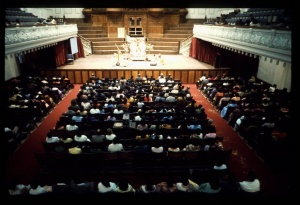SB 6.18.22

A.C. Bhaktivedanta Swami Prabhupada
TEXT 22
- śrī-sūta uvāca
- tad viṣṇurātasya sa bādarāyaṇir
- vaco niśamyādṛtam alpam arthavat
- sabhājayan san nibhṛtena cetasā
- jagāda satrāyaṇa sarva-darśanaḥ
SYNONYMS
śrī-sūtaḥ uvāca — Śrī Sūta Gosvāmī said; tat — those; viṣṇurātasya — of Mahārāja Parīkṣit; saḥ — he; bādarāyaṇiḥ — Śukadeva Gosvāmī; vacaḥ — words; niśamya — hearing; ādṛtam — respectful; alpam — brief; artha-vat — meaningful; sabhājayan san — praising; nibhṛtena cetasā — with great pleasure; jagāda — replied; satrāyaṇa — O Śaunaka; sarva-darśanaḥ — who is aware of everything.
TRANSLATION
Śrī Sūta Gosvāmī said: O great sage Śaunaka, after hearing Mahārāja Parīkṣit speak respectfully and briefly on topics essential to hear, Śukadeva Gosvāmī, who was well aware of everything, praised his endeavor with great pleasure and replied.
PURPORT
Mahārāja Parīkṣit's question was very much appreciated by Śukadeva Gosvāmī because although it was composed of a small number of words, it contained meaningful inquiries about how the sons of Diti, although born as demons, became demigods. Śrīla Viśvanātha Cakravartī Ṭhākura stresses that even though Diti was very envious, her heart was purified because of a devotional attitude. Another significant topic is that although Kaśyapa Muni was a learned scholar and was advanced in spiritual consciousness, he nonetheless fell a victim to the inducement of his beautiful wife. All these questions were posed in a small number of words, and therefore Śukadeva Gosvāmī very much appreciated Mahārāja Parīkṣit's inquiry.